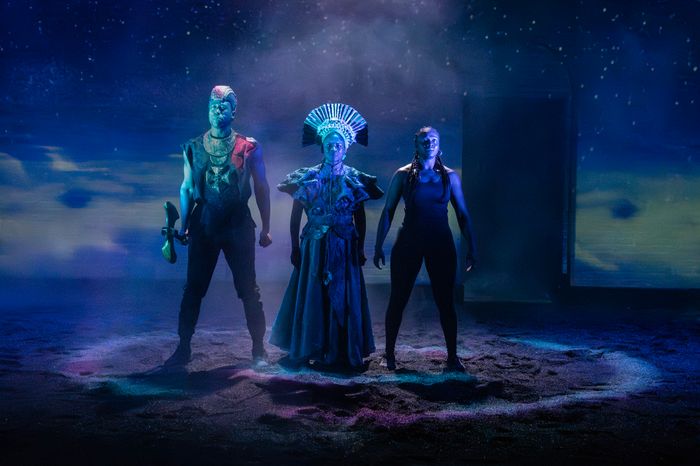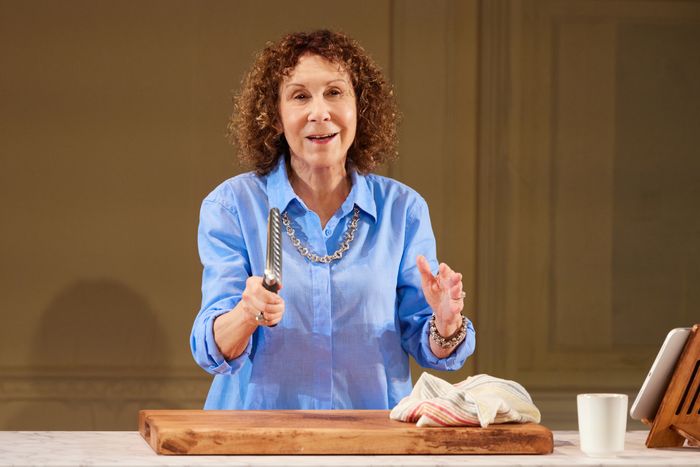
ItÔÇÖs been a summer of┬áOff Broadway theatrical basketball, full of strategies that range up and down the court. In Rajiv JosephÔÇÖs King James, we got professional fandom as a way to explore friendship and masculinity between two friends, with the action kept off the court in a Cleveland wine bar and a souvenir shop. In Candrice JonesÔÇÖs Flex, high-schoolers with WNBA dreams run drills on a court onstage, as the actors face the added pressure of having to drain a basket when the plot demands it. Now, in The Half-God of Rainfall, the playwright and poet Inua Ellams has zoomed things all the way out, using the basketball court as the setting for epic mythological conflict. The play is staged in sand, as if the audience is gathered around the improvised court on a Nigerian alluvial plain where Demi, EllamsÔÇÖs half-divine hero, discovers his superhuman athletic ability. ItÔÇÖs a place that becomes, as the character of Zeus himself describes it, ÔÇ£the Battle Field, The Court of Kings, the Test,ÔÇØ where Homeric-style heroics can take place in the present day. To that end, the athleticism we see onstage is abstracted, with Mister Fitzgerald, who plays Demi, miming dribbling and shooting without a ball, surrounded by a whirl of images from (say) an NBA tournament via Tal YardenÔÇÖs projections.
That approach, from director Taibi Magar, keeps the sport itself at a distance throughout EllamsÔÇÖs ambitious, lore-spanning drama, which makes the staging of Half-God as a play, not just poetry, a bit blurry. The smaller scale of human action and character gets lost amid the grand sweep of mythology and language. EllamsÔÇÖs text has a lot on its mind. Already published as a book, it melds together Greek and Yoruba mythology (with a few cameo appearances from members of other pantheons) as well as modern stardom and sexual assault. Demi is the son of Mod├║pß║╣╠ü, a beautiful priestess who is raped by Zeus after he wins a bet with another god. As a kid in Nigeria, Demi discovers incredible skill at basketball, and then makes it to the American pros. There, fans start to worship his talent, which pricks the anger of the actual gods, who donÔÇÖt like being overlooked ÔÇö theyÔÇÖre already bitter about losing followers in modernity ÔÇö and start plotting a way to undercut his hubris.
EllamsÔÇÖs world bursts with ideas about myth and sport, and his play can barely wrangle all of the lyricism and lore into compelling stage action. The play takes place everywhere from the London Olympics to the farthest reaches of the galaxy, with jokes about particular demigods of sport and grand philosophizing. The seven actors in Half-God split up the many characters, introducing themselves and their roles at the top of the play and stepping between deities and mortals with the help of jerseys, headgear, and prop weaponry (Zeus has a thunderbolt; his Orisha thunder-god counterpart, Sango, has an ax). Ellams and Magar take the approach of showing and telling: The actors describe, say, a race between the gods or a basketball final, while also pantomiming it. If DemiÔÇÖs halfway between god and human, this is halfway between poetry reading and theater. You want to pay full attention to EllamsÔÇÖs language, and you also want to take in the stage picture. When it works, as in a brutal moment when Zeus rapes Mod├║pß║╣╠ü, the text and language add up to further discomfort, but too often the poetry and the theater compete. A divine battle scene, heavily narrated, comes a little too close to resembling live-action role play.
The actors are all quite able at establishing their charactersÔÇÖ personae with a gesture or two ÔÇö Lizan Mitchell has just the right gleam in her eye to play a trickster god ÔÇö providing the play with the human-scale specificity that EllamsÔÇÖs descriptions occasionally lack. Fitzgerald, who sticks with Demi, brings out the wide-eyed na├»vet├® that is sometimes part of incredible talent (in every mythology, thereÔÇÖs always something a little coddled about demigods), and Jennifer Mogbock, who plays Mod├║pß║╣╠ü, grounds her despair with a physical defensiveness, like sheÔÇÖs trying to wrestle that despair to the ground. As Half-God progresses, Mod├║pß║╣╠ü moves to the center of the story, and Mogbock carries her conflicted emotions well, though Ellams provides her with an ending that, after all his globe-trotting lore, becomes too tidy. She seeks revenge on Zeus, but the terms of that revenge shrink the play toward applause-generating resolution. ItÔÇÖs a case when, in the opposite of elsewhere in the play, leaning on dramatic structure does a disservice to the epic. Ellams had built up such an intriguing world that, rather than wrapping up, I wanted it to keep expanding.
LetÔÇÖs Call Her Patty is focused not on an array of divine beings but on a few city blocks in the Upper West Side and their ne plus ultra resident, Patty. SheÔÇÖs the ultimate meddling Jewish mother, played by Rhea Perlman, who spends much of the one-act slamming a knife against a cutting board to mime chopping onions and complaining about the state of the world to her niece Sammy (Leslie Rodriguez Kritzer) while fretting over her daughter Cecile (Arielle Goldman), a rising visual artist with a cocaine addiction. Zarina SheaÔÇÖs setting is hyperspecific, with references to Barney Greengrass and the Han Dynasty, to the extent of feeling claustrophobic. Patty is deeply set in her ways with a very small vision of the universe. The trouble is that Shea and director Margot Bordelon canÔÇÖt get the drama out from under her.
In large part, thatÔÇÖs the result of the star. YouÔÇÖre here to see a great familiar character actress do her thing, and sheÔÇÖs having a grand old time chewing scenery and deploying zingers about PattyÔÇÖs neighborhood nemeses (she distrusts a woman who wears beads, never mind that she also likes to wear beads). PerlmanÔÇÖs fun, but she sucks up the oxygen. Sammy is the playÔÇÖs actual narrator, and Kritzer is doing heroic work uphill trying to play the straight woman to Perlman while also interjecting context and keeping the action flowing. Sammy sees what Patty would prefer to ignore, such as the fact that PattyÔÇÖs smothering has made it impossible for her daughter to develop into a complete person, and she points this out to her even as Patty herself brushes it away. That dynamic leaves Cecile and Goldman on the sidelines. In one scene at a rehab center, Patty keeps talking at her daughter, leaving no space for Cecile to express herself. ThatÔÇÖs a believable (and funny) interaction, but in that moment, the play is doing the same thing Patty is.
In some of SammyÔÇÖs narration, Shea falls back on the point that a woman like Patty is the product of her circumstances. She got into her co-op apartment through a series of breaks of boomerish luck, all of which depended on a postwar New York wealth boom and delivered her into relative comfort and complacency. ItÔÇÖs a true observation, but it needs to be more than just pointed out. You want the play to upset that comfort, and to reckon more deeply with CecileÔÇÖs addiction and recovery. But Patty and Perlman win the day. Once LetÔÇÖs Call Her Patty wraps up, thereÔÇÖs nothing to stop you from wandering away from Lincoln Center and enjoying a perfectly lovely evening at, say, the Upper West Side branch of CarmineÔÇÖs.
The Half-God of Rainfall is at New York Theatre Workshop.
LetÔÇÖs Call Her Patty is at the Claire Tow Theater.



